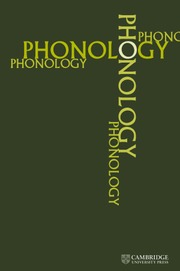T. Alan Hall and Ursula Kleinhenz (eds.) (1999). Studies on the phonological word. (Current Issues in Linguistic Theory 174.) Amsterdam and Philadelphia: John Benjamins Publishing Company. Pp. vi + 297.
Published online by Cambridge University Press: 21 November 2002
Abstract
Determining where words begin and end can be a vexing task; one which requires knowledge of the phonological and morphosyntactic structure of a language. Studies on the phonological word is a compilation of articles which grew from a conference on the phonological word held in Berlin in 1997. There are nine papers, the first being a useful overview of the state of the art with respect to the phonological word. The remaining articles provide detailed studies from a diverse set of language families, including Salishan (Beck), Bantu (Downing), Indo-European (Booij, Hall, Raffelsiefen, Vigário), Algonquian (Russell), Siouan (Russell), as well as from Israeli Sign Language (Sandler). Each study provides detailed argumentation and makes more than a few points of interest regarding issues surrounding the phonological word. The volume provides many valuable contributions of interest to both theoretically and empirically inclined phonologists and morphologists.
A thorough coverage of each contribution would lead well beyond the scope of this review. Instead, following the overview, a central theoretical and empirical point from each article will be provided. This is followed by a brief discussion of some of the general and recurrent themes of the studies presented in the book.
- Type
- Reviews
- Information
- Copyright
- © 2000 Cambridge University Press
- 1
- Cited by




